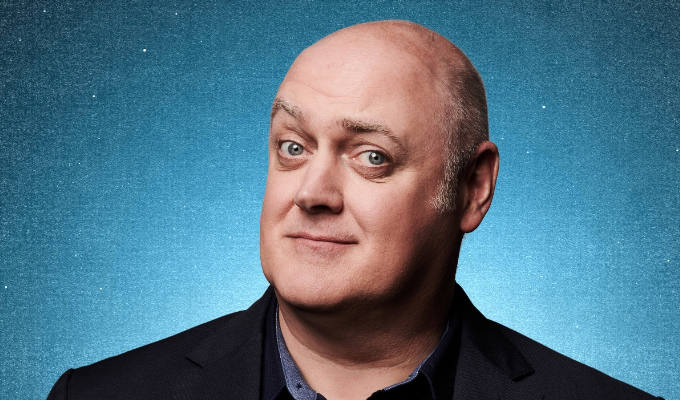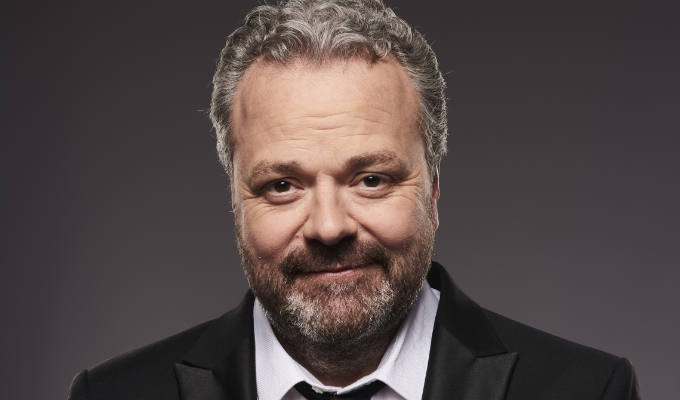Comedians
Note: This review is from 2009
Review by Bruce Dessau (comedy critic for the London Evening Standard)
I guess this is what you call a busman's holiday. I'd usually be at a stand-up comedy gig on a Saturday night. This Saturday I was at a play about stand-up comedy. Comedians at the Lyric, Hammersmith. The action is set on a rainy Manchester evening when a group of stand-up students, taught by veteran vaudevillian Eddie Waters (Matthew Kelly), audition for prospective booker Bert Challoner (Keith Allen).
The play is fascinating for all sorts of reasons, but the one that sprang most immediately to mind was how far ahead of its time it was. The Comedy Store did not open until May 1979 and is generally accepted as the point when alternative non-sexist, non-racist humour started. Comedy was never the same again.
Yet four years earlier, at the Nottingham Playhouse where it premiered, Trevor Griffiths' heavyweight play about the dark side of light entertainment tackled the same issues. Why does comedy have to fall back on easy cliches? Do you play to your audience or be true to yourself? Should comedy be about getting laughs or about something more meaningful? For Challoner the laugh is the be all and end all. Waters demands more: ‘A joke that feeds on ignorance starves its audience.’ But with the chance of a big break from Bert the students have a stark choice – do they compromise and kick-start their careers or do they go for something truer?
Comedians seems to occupy the same relationship to alternative comedy as, say, Dr Feelgood, occupied to punk rock. Both came along a few years before the real deal and juggled similar ideas in a slightly different form. It would take the likes of Rik Mayall and Alexei Sayle/The Sex Pistols and The Clash to formalise the revolutionary ground rules and create a cohesive scene. It is a nice irony of course that Keith Allen plays the old school veteran here as he was one of the angry young class of '79.
The middle section of the three-act production is the most interesting as well as the most entertaining. The theatre stage becomes the shabby stage of a Working Men's Club where the bingo is interrupted by the students hoping their showbiz number will come up. Their attempts vary from those playing the conventional game – the cliched bow-tied Irishman doing thick paddy jokes, the dapper Jewish comedian doing Jewish gags – to those trying to be true to themselves.
Another Irish wannabe has a more nuanced style – still much more Jimmy Cricket than Dylan Moran, but getting there. And then there are two turns who provide the most disturbing moments of the evening. Mark Benton and Reece Shearsmith's double act has all the inherent tensions of a warring twosome writ large and then some as one wants to compromise, the other wants to stick to his guns. An undertow of edgy, awkward violence permeates their friendly banter.
Finally, however, there is Gethin Price (David Dawson), a white-faced, shaven-headed mime-artist who is all class war anger and provocative bile. There is not much comedy in his confrontational act, but something compelling in the way he struts balletically around the stage in his bovver boots or pretends to play a tiny violin. I can't see him lasting long at the Comedy Store's King Gong talent try-out, but who knows, maybe he would have done OK at Malcom Hardee's anything-goes Tunnel Club.
Comedy courses are ten-a-penny these days, but I didn't even know that these courses existed in 1975. I thought that back then you're best way of starting out was straight into the Working Men's Club or maybe, if you were canny and cautious, via Butlins. The comedians' dream was a shot on Granada TV's The Comedians (no relation) which wasted valuable airtime on the likes of Bernard Manning and Mike Reid. Or else there was New Faces and Opportunity Knocks, which spawned Lenny Henry, Victoria Wood and Les Dawson.
Yet there were clearly other openings for comedy. Billy Connolly and Jasper Carrot came through via the folk music scene as their gags became bigger crowd-pullers than their music. Stewart Lee has talked about the mid-seventies alternative performance circuit that spawned the likes of John Dowie. There was also the embryonic political knit-your-own-muesli post-hippy circuit where the likes of Alexei Sayle and anarcho-veteran Tony Allen cut their subversive teeth.
So maybe Griffiths' Comedians didn't spring up in a vacuum. There was clearly something in the air in 1975. And maybe this is a timely revival. The play might be a period piece, with its flares, dickie bows and references to Max Bygraves and George Formby, but with the likes of Frankie Boyle, Jimmy Carr and Ricky Gervais making a mint out of post-ironic offensiveness now is a good time for comedy to sit back, take stock. and ask again what is comedy for? Is it all about breaking taboos? Breaking tension? Does comedy matter and if so why?
The climax of Comedians isn't completely satisfying. The grey-clothed, grey-haired, grey-faced Waters turns out to be surprisingly sympathetic to Gethin's colourful avant garde antics, which is weird in itself and the reason given is even weirder. But for anyone who is remotely interested in the philosophy and psychology of why we need to giggle, Comedians is essential viewing. True comedy fans will get more out of a night of this than a year of Jongleurs.
Review date: 19 Oct 2009
Reviewed by: Bruce Dessau (comedy critic for the London Evening Standard)
Reviewed at:
Lyric Theatre Hammersmith






